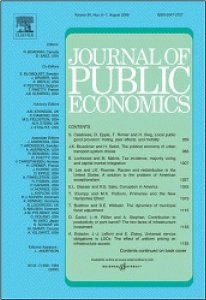
Jacobs, B. and Schindler, D. (2012). On the desirability of taxing capital income in optimal social insurance Journal of Public Economics, 96(9-10):853--868.
-
Affiliated authors
-
Publication year2012
-
JournalJournal of Public Economics
This paper analyzes optimal linear taxes on labor income and savings in a two-period life-cycle model with ex ante identical households, endogenous leisure demands in both periods, and general processes of skill shocks over the life cycle. We demonstrate that the Atkinson-Stiglitz theorem breaks down under risk. Capital taxes are employed besides labor income taxes for two distinct reasons: i) capital taxes reduce labor supply distortions on second-period labor supply, since second-period labor supply and saving are substitutes, ii) capital taxes insure first-period income risk, although this benefit is partially off-set because first-period labor supply and saving are complements. Our results imply that (retirement) saving should not be actuarially fair. {\textcopyright} 2012 Elsevier B.V.